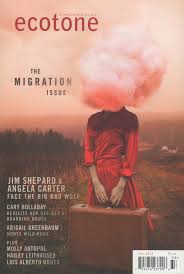The Essay’s Place
categories: Cocktail Hour
1 comment
 (The Essay’s Place appears in my regular “Out of Place” column in Ecotone, and you can see the whole essay here at the Ecotone site.)
(The Essay’s Place appears in my regular “Out of Place” column in Ecotone, and you can see the whole essay here at the Ecotone site.)
We live in a time when essays are often bullied into being articles, when the marketplace and the Internet, both ever-hungry for action, serve to cattle–prod the lounging essayist out of his or her natural ambling pace and into something closer to a march.
Meanwhile, the opposite is true within the monastery walls of MFA programs, where essays have become little subjective tingly things, tiny animals afraid of the world that take as their topics deeply personal matters and eschew form in favor of vaguely lyric spasms.
As you can perhaps gather from my language, I’m a fan of neither (with exceptions). The one has lost the spirit that first pulled me into the essay form, the ramble and contradiction, the personal showing of warts and all, but the personal with a purpose. The other has forgotten the world and only remembers the self, and often waves the banner of Montaigne in justification, forgetting that the only reason we read that first essayist is that the things he said of himself are true for all of us, to the point where, to paraphrase Emerson, we sometimes feel like we are reading our own thoughts. To oversimplify, you could say that in the first the world is too much with us, and in the second the world has all but disappeared.
I do not write about this dilemma from above it, but as someone at once pushed by outer forces and pulled by inner vision. I know I’m not alone here. A few years ago I invited the writer David Quammen to speak at the university where I teach, and the night before his talk we drank martinis in a local bar and discussed, among other things, the way that literary careers evolve. He told the story of his early love of Faulkner and how he spent his twenties working as a fishing guide in Montana while trying to write Faulknerian novels. He was accomplished enough at the former that when two editors for a new outdoor magazine went looking for a guide for a week of fishing, they hired him. In the course of the trip they became friends, and by week’s end the editors had offered their guide the chance to write a regular column in their magazine. The magazine was Outside and the column was “Natural Acts,” and so one of our best nonfiction writers was born.
As for me, I spent my twenties writing bad, clunky novels in which the characters quoted Thoreau to each other, until a professor of mine suggested that I cut to the chase and write nonfiction instead. Why not quote Thoreau directly? In both my case and Quammen’s, the self had one idea, the world another.
My wife, Nina de Gramont, is also a writer, and not long ago, the world came knocking at her door. Marvel Comics hired her to write a sort of new origin story for the X-Men character Rogue, and she did so under the pseudonym Christine Woodward. She took the job for the obvious reason, the one Samuel Johnson said we all write for: We needed the money. While this may sound crass, we both learned something from the experience. She wrote what she thought was an action-packed draft, trying to follow the dictates of genre. The editors liked what she came up with but reduced the length considerably, explaining to her that they had “cut out all the mooning about.” Mooning about! We laughed long and hard at that one. I suggested that it could have been the title of any of my early books. It has since become a watchword in our house for when either of us does too much lyric lounging in our work. And it goes without saying that much of what I read as a writing professor could go by that title. But before we bare our cutting knives, we should remember that this quality is something we also need to protect in our work, something threatened by the bullies of mammon, word count, and blogs.


Thank you for this, Dave. I’m so happy to see you highlight Amy Leach’s work. I think Montaigne is less inward than he appears. There’s something distinctly scientific about his approach to his essays–he acts more like an early natural historian, I think. That’s why he was so radical in his time. He embodies the inwardness and outwardness essay does best, though contemporary readings see his introspection. Great essay. Thanks again.